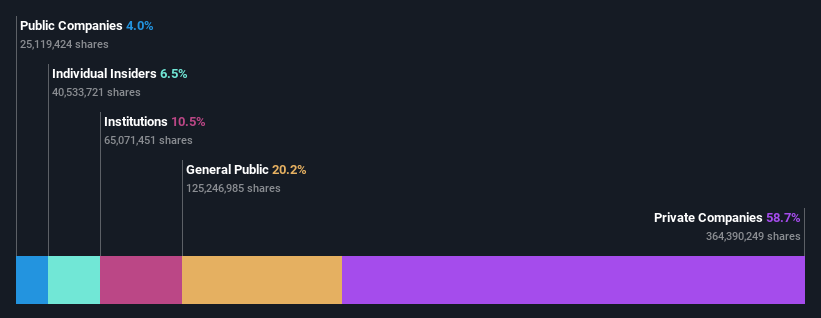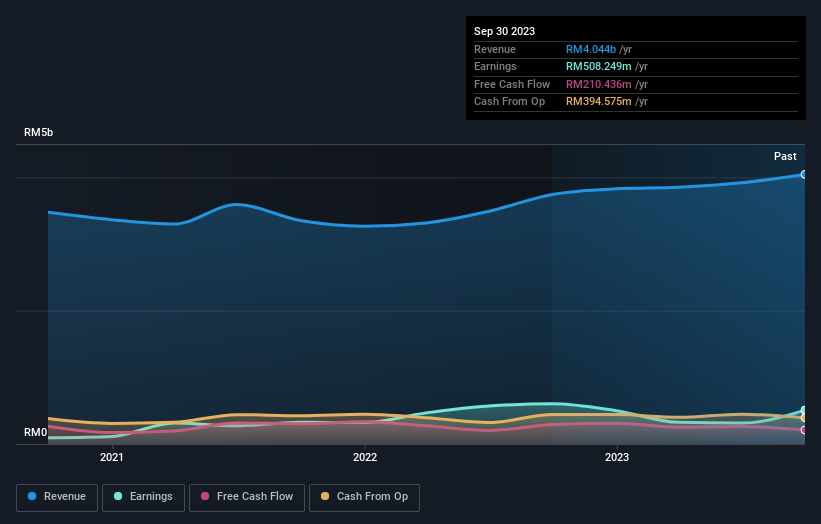Private companies account for 59% of Oriental Holdings Berhad's (KLSE:ORIENT) ownership, while individual investors account for 20%
Key Insights
The considerable ownership by private companies in Oriental Holdings Berhad indicates that they collectively have a greater say in management and business strategy
52% of the business is held by the top 2 shareholders
10% of Oriental Holdings Berhad is held by Institutions
If you want to know who really controls Oriental Holdings Berhad (KLSE:ORIENT), then you'll have to look at the makeup of its share registry. And the group that holds the biggest piece of the pie are private companies with 59% ownership. That is, the group stands to benefit the most if the stock rises (or lose the most if there is a downturn).
And individual investors on the other hand have a 20% ownership in the company.
In the chart below, we zoom in on the different ownership groups of Oriental Holdings Berhad.
See our latest analysis for Oriental Holdings Berhad

What Does The Institutional Ownership Tell Us About Oriental Holdings Berhad?
Many institutions measure their performance against an index that approximates the local market. So they usually pay more attention to companies that are included in major indices.
As you can see, institutional investors have a fair amount of stake in Oriental Holdings Berhad. This implies the analysts working for those institutions have looked at the stock and they like it. But just like anyone else, they could be wrong. When multiple institutions own a stock, there's always a risk that they are in a 'crowded trade'. When such a trade goes wrong, multiple parties may compete to sell stock fast. This risk is higher in a company without a history of growth. You can see Oriental Holdings Berhad's historic earnings and revenue below, but keep in mind there's always more to the story.

Oriental Holdings Berhad is not owned by hedge funds. The company's largest shareholder is Boon Siew Sdn Bhd, with ownership of 44%. In comparison, the second and third largest shareholders hold about 7.5% and 5.3% of the stock. In addition, we found that Su Tong Lim, the CEO has 1.9% of the shares allocated to their name.
To make our study more interesting, we found that the top 2 shareholders have a majority ownership in the company, meaning that they are powerful enough to influence the decisions of the company.
While it makes sense to study institutional ownership data for a company, it also makes sense to study analyst sentiments to know which way the wind is blowing. As far as we can tell there isn't analyst coverage of the company, so it is probably flying under the radar.
Insider Ownership Of Oriental Holdings Berhad
The definition of company insiders can be subjective and does vary between jurisdictions. Our data reflects individual insiders, capturing board members at the very least. Company management run the business, but the CEO will answer to the board, even if he or she is a member of it.
Insider ownership is positive when it signals leadership are thinking like the true owners of the company. However, high insider ownership can also give immense power to a small group within the company. This can be negative in some circumstances.
Shareholders would probably be interested to learn that insiders own shares in Oriental Holdings Berhad. As individuals, the insiders collectively own RM257m worth of the RM3.9b company. This shows at least some alignment. You can click here to see if those insiders have been buying or selling.
General Public Ownership
The general public, who are usually individual investors, hold a 20% stake in Oriental Holdings Berhad. While this group can't necessarily call the shots, it can certainly have a real influence on how the company is run.
Private Company Ownership
Our data indicates that Private Companies hold 59%, of the company's shares. It might be worth looking deeper into this. If related parties, such as insiders, have an interest in one of these private companies, that should be disclosed in the annual report. Private companies may also have a strategic interest in the company.
Public Company Ownership
We can see that public companies hold 4.0% of the Oriental Holdings Berhad shares on issue. It's hard to say for sure but this suggests they have entwined business interests. This might be a strategic stake, so it's worth watching this space for changes in ownership.
Next Steps:
It's always worth thinking about the different groups who own shares in a company. But to understand Oriental Holdings Berhad better, we need to consider many other factors. For example, we've discovered 1 warning sign for Oriental Holdings Berhad that you should be aware of before investing here.
Of course this may not be the best stock to buy. Therefore, you may wish to see our free collection of interesting prospects boasting favorable financials.
NB: Figures in this article are calculated using data from the last twelve months, which refer to the 12-month period ending on the last date of the month the financial statement is dated. This may not be consistent with full year annual report figures.
Have feedback on this article? Concerned about the content? Get in touch with us directly. Alternatively, email editorial-team (at) simplywallst.com.
This article by Simply Wall St is general in nature. We provide commentary based on historical data and analyst forecasts only using an unbiased methodology and our articles are not intended to be financial advice. It does not constitute a recommendation to buy or sell any stock, and does not take account of your objectives, or your financial situation. We aim to bring you long-term focused analysis driven by fundamental data. Note that our analysis may not factor in the latest price-sensitive company announcements or qualitative material. Simply Wall St has no position in any stocks mentioned.

 Yahoo Finance
Yahoo Finance 